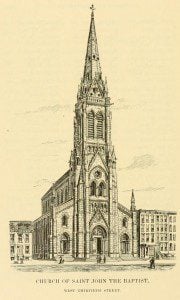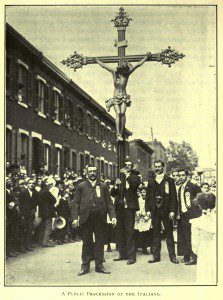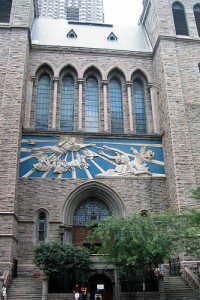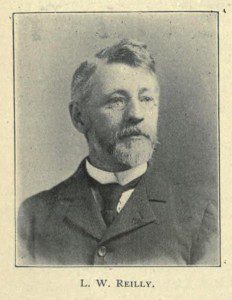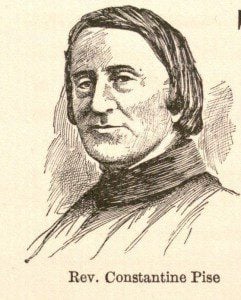 Catholic Literature in the United States– Address of the Rev. Dr. Pise (The Brooklyn Eagle, October 12, 1860)
Catholic Literature in the United States– Address of the Rev. Dr. Pise (The Brooklyn Eagle, October 12, 1860)
The Rev. Dr. C.C. Pise, pastor of Sydney Place Church, last evening delivered an address before the Catholic Library Association at their room on the corner of Court and Joralemon streets. A large number of ladies and gentlemen were present. Dr. Pise spoke as follows:
“YOUNG GENTLEMEN: It affords me very great pleasure in compliance with your very flattering invitation, to meet you here to-night; and if any remarks addressed to you on this occasion, will have the laudable effect of encouraging you in your new and laudable undertaking, you are a thousand times welcome to them. I rejoice to find that you have favorably progressed in the formation of a Catholic library in this city. I regard such an institution not only as a desideratum, but almost a necessity in such a community as ours, in order to counteract the deleterious influence which the anti-Catholic press is spreading over the land. Fortunately now, you have it in your power to fill your shelves with valuable books in every department of knowledge, and, in this respect, you enjoy an advantage which in former years others were deprived of; having within your reach an antidote to almost every vehicle through which evil or dangerous impressions are conveyed to the heart. This will be evinced by casting a hasty at the various departments of popular literature.
Commence with the daily papers, weeklies, monthly magazines, & c. The first, if they were not established, as it would appear for the avowed purpose of assailing and maligning the Catholic Church, yet they never let pass an opportunity of casting a slur at her doctrines and practices. The second, purporting to be “journals of civilization,” are not seldom disfigured with unseemly caricatures of sacred things, and venerable personages; while the third are mostly of the same sectarian stamp.
Fortunately, the country abounds to-day, with Catholic journals; and although we may not always agree with the political opinions and national and individual idiosyncracies of the Editors, still we may rest satisfied that they will prove sound on doctrines and morals. The chief of these is Brownson’s Review, the Editor of which is pronounced by Cantu, the great Italian author of Universal History, the first prose writer in America; and, although he may occasionally startle his readers with some novel theory, or some daring idea, still, he was been, and I hope will continue to be, a very Hercules in his labors for the Church. Though not yet ranking among the aged men of the country, still I can remember the time, when there was not a single Catholic journal in the United States. The first was issued by the venerable Dr. England at Charleston, South Carolina, entitled the “United States Catholic Miscellany,” and survives, ably edited to the present day. The first monthly magazine was started in Baltimore by the late Dr. Damphouy, a very talented and learned French priest, with whom I myself was associated. It was styled the “Metropolitan,” and though apparently an insignificant brochure, its pages were enriched with contributions from such men as David, Brute, Kenrick, Purcell, Hughes, & c.
The present times are more favored. For now, upon your tables may be spread a variety of Catholic periodicals from almost every prominent diocese in the country. In the department of history, at one time the only resource to which the Catholic reader could recur for a knowledge of the mother country, England, were the volumes of Hume, under whose polished style were hidden innumerable distortions of facts, and lurked the secret venom of skepticism. Even the history of Catholic Maryland was left to the mercy of Protestant authors; now, however, we have the faithful and elegant volumes of Dr. Lingard, whose classic style suffers no disparagement in comparison with Hume’s, while his accurate statement of events displays the fallacy of that boasted author and mocks the romantic genius of Macaulay. His history of the Anglo-Saxon Church is a perfect gem. Mr. McSherry has filled up the deficiency in the history of Maryland by his excellent production. In the field of polemics, what varied and powerful acquisitions have not been made in recent years? Formerly, we were confined to Milner, Fletcher, and a few others, able and learned controversialists, it is true, but who pursued the beaten scholastic route of argument and disputation. Milner’s “End of Controversy” verifies its title; his “Letters to a Prebendary” are among the finest compositions in our language.
To these venerable names are now added in England, those of Cardinal Wiseman, Dr. Newman, and a host of others, most of whom are converts from Puseyism; and in our republic of England, Kenrick, Hughes, Spalding, Purcell, Ives, Judge Burnet, & c., & c., all handling with varied and powerful skill, the subjects which they treat; so that now in the pursuit and investigation of truth the tastes of all may be suited, in order to study the proofs and vindication of Catholic doctrine.
Books of travel have always been a dangerous element in the department of letters. Tourists seem to have visited Catholic countries, especially Rome, for the purpose of criticizing and misrepresenting everything pertaining to their government, as well as their religion. This may be affirmed of nearly all Protestant travelers from Addison’s “Letters to Italy,” down to Kips’ “Christmas Holydays at Rome”—for, though the immortal author of the spectator could not withhold a reluctant tribute from the Pope, who, he says, being a generally aged man, and with no passions to indulge, governs his subjects with a paternal sway, still, he loses no opportunity to utter his refined abuse against the Church itself. To these superficial and unfair effusions of bigoted men, we, at last, have a salutary antidote in Maguire’s “Rome and its Ruler,” a work which was justly recommended to your attention on a former occasion, by the esteemed Pastor of “The Star of the Sea,” and which, especially at this critical juncture of Italian affairs, should hold a conspicuous position upon your shelves. Dr. Nelligan’s work, too, on the “Institutions of Rome” is not unworthy a place by its side.
What shall I say of works of fancy? This style of literature was exclusively monopolized by Protestant authors, who infused into their tales, whenever Catholic doctrines or usages were in question, a poison more insidious, because administered under the fascination of fiction, and the beauty of language. My memory can go back to the period when there was no Catholic work of fiction published in this country; in fact, without incurring the charge of egotism, I take to myself some credit of having introduced that style of composition. In the commencement of my ministry in Baltimore, a little tale was published in that city by the Protestant press, entitled “Father Clement,” written expressly against the Church, in a winning and novel style. Some young ladies, not of our faith, but free from prejudices, having read it, were startled at some of its statements touching our belief and discipline, ad desiring to be informed as to the truthfulness of them, they requested me to give an answer to them in writing, that they might be able on my authority to contradict those misrepresentations. I then determined to return “a Roland for an Oliver,” and composed “Father Rowland,” which became the avant courier of numberless other little volumes of a similar character, that have since issued from the Catholic press in this country.
In England some of the greatest minds have not disdained to mingle in romance the utile dulce—as Cardinal Wiseman in his “Fabiola,” and Newman in “Callista,” “Lectorum delectando pariterque monendo.” Of ascetical books in English which were formerly rare and few, we now possess a goodly share, in the shape of instructions, lectures, essays, biographies, & c., by learned and pious men—“Manning’s Moral Entertainments,” written a century and a half ago, and now, out of print, are full of unction, and composed with a purity of style that justly vies with the Spectator. “Butler’s Lives of the Saints” stands alone, an unrivalled and imperishable account of industry and rendition. The “Life of Mother Seton,” foundress of the Sisters of Charity in this country, by Dr. White, which should be read by every Catholic. Among writers of this class conspicuously shines the name of the devout Father Faber, on whom the mantle of asceticism seems to have fallen from the Fathers of a spiritual life.
In a word, your Library may now be stored with excellent Catholic works, in every department, except, perhaps, in that of poetry. I regret to be compelled to admit that here we still feel our deficiency, and I know not why it should be so—there are certainly materials enough to fill up this chasm, scattered throughout the field of letters. They have only to be collected by some man of genius and taste, some Dr. Huntington, for instance, (whose “Rosemary,” by the bye, has added a fresh leaf to the chaplet of his reputation) and several volumes that might be filled with the “disjecta membra” of the Catholic muse, which would not shrink from a comparison with any other. Will not some enterprising publisher undertake this task? In every other respect, you can now have recourse to pure sources of Catholic literature, and can share the advantage you possess with others, who may desire to drink at the same limpid fountains.
Sincerely then I congratulate you, on the progress you have made in your most useful and interesting association. Here, surrounded by books, you may meet in social and instructive circles, improving your minds and mingling your sympathies together in the cause of morality and education. Nothing is so useful and delightful as the study of knowledge, and especially that—the beginning of which is the fear of God—“initium sapientiae timor Domini.” It is necessary that you study your religion, that you make yourselves well acquainted with the real dogmas of the Church, and the grounds of proof on which they stand. I say real, because they are too often not rightly appreciated by Catholics, who have never studied them, and misrepresented by non-Catholics who are ignorant of them. It is true the mysteries of religion are too sublime to be understood by the human mind; nevertheless there are evidences of their truth, which not only strike, but convince it. After all religion is a reasonable homage; that is, by investigating its reason must acquiesce in the conclusion that it is divine, and, therefore, that all its teachings emanating from above, demand our unwavering assent.
In a country like ours, surrounded by influences averse to our faith—where the very atmosphere is tainted with Protestantism—it is a duty incumbent upon all Catholics to know why they believe, and to be able to state their reasons when interrogated. No one deprecates more than myself anything like acrimonious controversy in social life, yet no one would urge more earnestly than I do, the necessity of arming yourselves against the objections and sophisms that too frequently assail our most sacred doctrines and usages, and, of being able, by study to give an account of the faith that is in you. Better employ your evenings in such pursuits, than to waste them in idleness, or to spend them in dangerous amusements.
If Cicero found more pleasure in devoting himself to profane study, than in any of the amusements of Rome, how much greater will not you derive from the study of sacred things? “Who,” said that great man, “will find fault with me, or who will have any reason to reprehend me, if the time which others give to business, to the games on festival days, and even to the repose of mind and body, if the time which they spend in feasts, gaming or ball-playing, I devote to the pursuit of study?”
Go on then, young gentlemen, as you have begun: and, with the approbation of our respected Bishop, the encouragement of the clergy, and, above all the blessing of Heaven, your generous enterprise cannot fail to be crowned with merited success.
NOTE: Father Charles Constantine Pise (1801-1866) was the author of Father Rowland (1829), which is commonly regarded as the first American Catholic novel. From 1832 to 1833 he served as the first Catholic Chaplain to the United States Senate.


